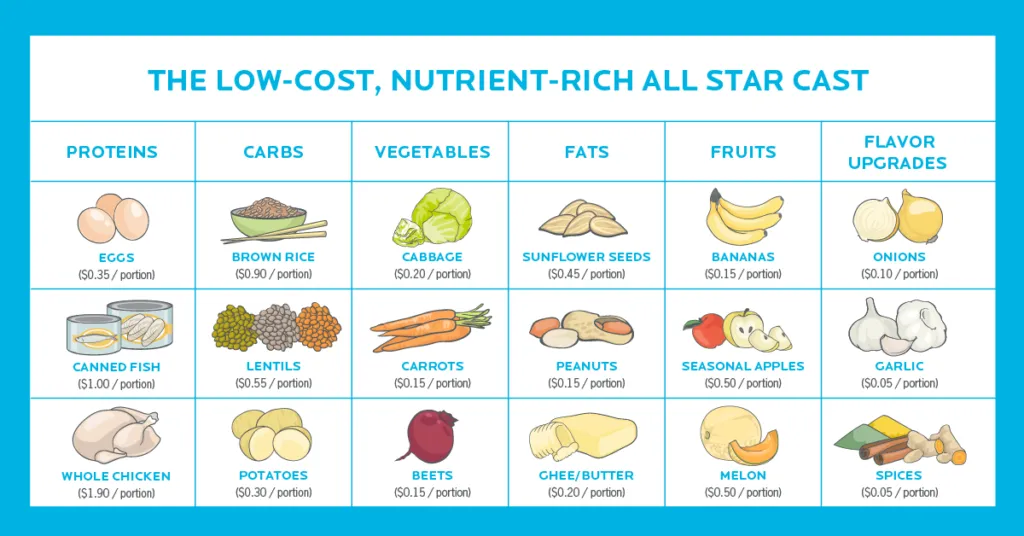What you eat every day affects your health and how you feel now and in the future. Combined with physical activity, your diet can help you achieve and maintain a healthy weight, reduce your risk of heart disease, diabetes, high blood pressure and obesity, and promote your overall health and well-being. Start with small changes that you incorporate into your daily habits, you can have a big impact on your eating habits and create healthy eating habits that last a long time.
Try to include at least six of the following eight goals in your diet by adding a new goal each week. Once these small changes become a habit, you can continue to make healthier choices. For example, instead of adding a salad to your diet once a day, you should consider how to eat a healthy diet every day.
If you are overly concerned with calorie counting, you may not be thinking about your diet in terms of calories per day, but rather about calories in and out.
The cornerstone of a healthy diet should be to replace processed foods with real foods whenever possible. Eating foods that are natural and made in nature can make a huge difference in the way you think, look and feel. Focus on avoiding packaged and processed foods and opting for more fresh ingredients whenever possible.

source: https://blog.cambly.com/2016/12/15/10-tips-to-healthy-eating/
To eat healthily, you need to combine nutrition science with a good understanding of the differences between healthy and unhealthy foods, and the difference between the two. With these simple tips, you can break the confusion and learn how to prepare and maintain a tasty, varied and nutritious diet that is good for you, your body and the health of others.
The food you eat has a big impact on your health and quality of life. Here are six ways you can eat healthy, delicious meals and really enjoy what you eat. Most of us know that we are better off eating energy bars and sweets, but what if we slow down when we eat?
While healthy eating can be relatively simple, the increasing diets and diet trends can cause confusion. In fact, these trends often distract us from the basic dietary principles that matter most to us, such as healthy fats, protein, carbohydrates, and fiber.
Follow dietary guidelines - and eat a healthy diet every day, regardless of age, gender, race, religion or lifestyle.
You may not need studies to say that vegetables are healthy, but research shows that eating seven or more servings of vegetables a day significantly lowers your risk of cancer, heart disease and stroke. If you're not convinced, make sure you're smart about superfoods: Infographic: So-called superfoods alone don't make you healthier. But adding nutritious foods to an already balanced diet can bring health benefits, and vegetables are burdened with age-related diseases. Fight back with antioxidants and fiber that promote gut health and help you stay full.
Eating and serving healthy on a budget may seem difficult, but it's doable and you can. Being creative can help you stick to your budget and incorporate nutritious foods into your diet. Try these tips to put inexpensive foods on your weekly menu and experiment with different vegetables and fruits.
Use the facts about packaged foods and canned food to make healthier choices. The labels indicate how many servings are in each package and list all nutrients, including fat, salt, sugar and portions.
If you would like to know more, talk to your doctor or see a registered dietitian in your practice or on your health care provider's website.
Try these daily tips that will help you and your family find a step-by-step approach to healthy eating. Follow healthy guidelines to update your eating style and improve your nutritional profile. Healthy home cooking and smart shopping give you control over what goes into the recipes and into your body. Eat well with your families and try these daily tips for a healthy, balanced and healthy family meal.
Tracking your food and counting calories can help you keep your numbers the way you want them. Learn how to track what you eat to lose weight and maintain a healthy weight, but how do you do it? Alarmingly low numbers in sight So you have enough control to make it work for you and stop counting calories.
Extreme calorie deficits can make it difficult to lose muscle, not just fat, which ironically can make you less fit than you were at the beginning.
Foods with high fiber and protein content have a filling effect, which means that you feel full after every meal. Eating healthier may mean learning new recipes and buying different foods than usual, but take your time to learn and get used to it! Eating nutrients - dense food not only keeps you healthy, but also makes it easier to stick to your diet plan.

source: https://www.precisionnutrition.com/eat-healthy-on-a-budget-infographic